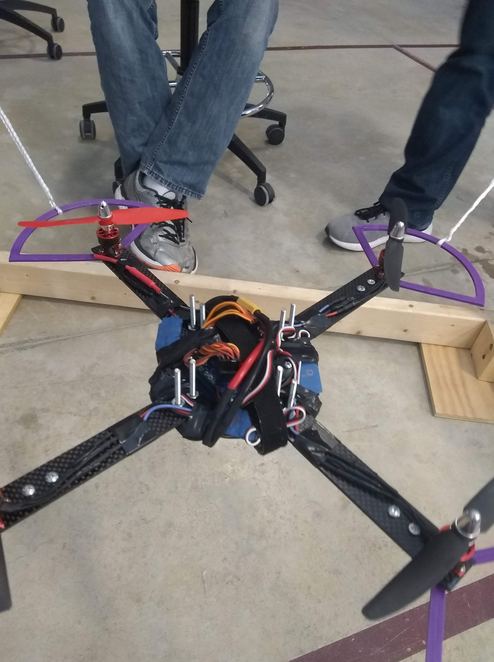Calvin engineering students build drones for their interim class
A drone that one group of student in the class built.
A group of Calvin College engineering students built drones as part of their course requirement during Interim 2019. Mobile Robotics Systems (fondly referred to as “Quadcopters”) is categorized as an engineering special topic interim, which is a requirement for the engineering degree.
Quadcopters is a hands-on class where the students can apply engineering skills to design and build a drone. Students were grouped into teams of four to five individuals and the class was heavily team based. Before building the drones, students made a lot of presentations.
There were days where students engaged in research, brainstorming and designing. For instance, some students presented on the application of drones, the design of a drone tether (which is a device used to test drones which, when not tied down, would flip over and break or skitter off and slice someone’s leg), a review of previous drone designs and many others.
Students received batteries, remote controller/receivers as well as flight controllers. However, students were also required to research different types of batteries that are used in drones. As part of the early stages of development, students had to define specific requirements for their brainstormed drone applications. Specifically, they needed to know how heavy the drone would be, how powerful the motors had to be and how long the battery had to last. With regards to the physical material of the drone frame, students had access to 3D printers as well as access to materials like carbon fiber sheets, carbon fiber tubes and aluminum sheet metal.
Each team had to build a functional drone from scratch. Essentially, 35 percent of the course grade was based on if the students could get the drone off the ground, though the course was pass/fail overall.
“An exciting moment was when we could fly our quadcopter on a leash”, said Samuel Olson. Students spent a sizeable amount of time communicating between teams, especially when they had problems. Moreover, students were assisted by their professor, Mark Michmerhuizen.
“This class is a really nice change of pace from the heavily technical material we have had in classes during the semester, in addition to drones being an application of a controls system”, says Melissa Van Baren.
Van Baren continued, “I really enjoyed this class. I kept myself really busy during the interim, but this class was enough work that it definitely felt like a class, but little enough work so that I could still balance everything without feeling too overwhelmed. If you’re considering taking this class, do it! I totally recommend it!”







